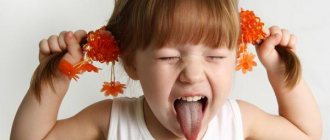Recently, more and more parents are turning to doctors with the request “I have a hyperactive child, what should I do, tell me?” It is clear that the health of their children is the main thing for them, but sometimes the type of disorder such as “hyperactivity” in relation to their children is undeserved. Very often it is confused with attention deficit or completely normal child behavior.
Signs of hyperactivity
- Inattention. Despite the fact that the child is very active and interested in the world around him, his attention is superficial. When performing one action, he will be constantly distracted by extraneous sounds, movements and other irritants. Therefore, parents have to put a lot of effort into learning letters or a rhyme. Or, for example, while drawing, he will simultaneously grab objects that are not needed for drawing. Due to difficulty concentrating, such a child is usually distracted, forgetful and disorganized.
- Overactivity. It is simply unbearable for him to wait in line and sit still for a long time. He moves and talks a lot, and because of this, he cannot always carry out instructions from adults efficiently. If you put a hyperactive child in a chair, he still won’t stop. At least he will be guaranteed to twitch his legs or fidget in his chair. He won't be able to stand still for even a few minutes.
- Impulsiveness. They are unrestrained and show emotions without thinking about the consequences. They are guided only by momentary impulse and desire. If something doesn’t work out for a hyperactive baby, he will immediately cry, whine, and may even squeal. They insert themselves into the conversation of others, interrupt, or ask questions without hearing the answers. It is difficult for them to adhere to the rules, and even at school they shout out from their seats without waiting to be called to the board.
- Restlessness of sleep. Such children, even in their sleep, can twitch, constantly throw off the blanket, toss and turn, talk or scream. Sometimes they try to snuggle closer to their parents, as if they were afraid of something.
You can learn more about the signs and treatment of hyperactivity from the article at the link.
Games with hyperactive children
- Games for developing attention
- "Catch - don't catch." The most famous game in this category is “Edible - Inedible”. The presenter throws the ball to the child and says the word. If this word means an edible object, the baby must catch the ball, and if it is inedible, then return it. By analogy with this, you can come up with many different games that will be interesting specifically for your child (for example, “Transport is not transport”, “Living - inanimate”, “Dangerous - not dangerous” and so on).
- "Pathfinders". Choose a small toy and hide it in the room, but so that it can be seen. To find the right item, the baby needs to be attentive and not be distracted by other things.
- “Ears on the Top of the Head” is a game aimed at developing auditory attention. Its essence is to hear which of the named words have a certain sound. For example, agree that you will say words, and the child should clap his hands every time he hears the sound “r”.
- Games to develop self-control
- “Freeze.” Turn on dynamic, fun music and invite your baby to dance. As soon as you press pause, the child should freeze in place.
- "Wait for the signal." This is a word conversation game. Its essence lies in the fact that the adult asks the baby various questions, and the child can begin to answer them only after a certain signal (for example, when you touch your ear with your hand or fold your arms over your chest).
- “I’m silent - I whisper - I scream.” The child’s task in this game is to perform all actions, focusing on the sign that the adult shows him. Agree with the baby on the conventions: for example, a sleep gesture - the baby should be silent and not move, a finger at the lips - speak quietly and move slowly, hands up - you can scream, run and jump.
- Games to relieve emotional and muscle tension
- “We draw with our fingers.” Ask your child to take a relaxed position and close their eyes. On his back or palm you can “draw” various figures, numbers, letters and other schematic images with your finger. The child must guess what you drew.
- "The wind is a breeze." Together with your baby, draw a strong wind and a weak breeze with your hands. This can be done to classical music, depending on its tempo.
- "Soap bubble". In this game, the adult pretends to be blowing a soap bubble, and the child “flies” around the room like a bubble. After the command “burst”, the baby must lie on the floor.
Tips for parents
How to raise a hyperactive child when sometimes it becomes difficult to be around him? Such children require a lot of attention, their excessive activity tires and often irritates. Our recommendations will help parents learn how to deal with their fidgets and enjoy the process of parenting. Besides, you must agree that a child’s overactivity is much better than when he is not interested in anything and is calm and apathetic all the time.
Considering the fact that the little ones themselves sometimes have a “hard time,” it is necessary to initially focus on paraphrasing, namely, “how to help a hyperactive child.” Then it will become much easier for parents too. Therefore, it is important to organize the baby’s life in such a way as to minimize the manifestations of the syndrome. Life is difficult for fidgets, parents criticize, scold and get upset all the time, they cannot establish relationships with their peers. Plus, something constantly breaks in their hands, falls and breaks. An overloaded nervous system has difficulty coping with daily stress.
Recommendations from psychologists
- Help your child concentrate. Instead of scolding him for inattention, try helping him follow his interests. Only with small stops, so that over time you develop the ability to linger on one activity or subject. Every time he switches, ask about what exactly distracted him. For example, “What did you see now?”, “What else is interesting about this object?”, “What does it feel like?”...
- Teach him to listen to himself. Due to the fact that fidgets are often distracted, they do not have time to notice their feelings and needs. Help them learn to recognize their feelings. Often ask questions such as: “Do you like this book?”, “How are you feeling now, are you upset?”, “Are you tired?”, “What would you like now?”...
- Learn to make choices. Sometimes it is difficult for parents themselves to make a choice, and for hyperactive children this is sometimes a very difficult task. Start with small things, such as providing choices in clothing or food. Only it should be very limited, for example: “Which sweater will you wear, red or blue?” Thus, they, again, listen to their feelings, and then, relying on them, make a choice.
- Show respect. Hyperactive children find it difficult to trust the world because it is critical and impatient towards them. Give him the right to feel what he feels, even if it is anger or resentment. Give yourself the opportunity to not meet your expectations. He is different, and may not always present himself to the world correctly, or in the way you would like. And if he feels that he is accepted for who he is, and taken seriously, he will be able to relax a little. And accordingly become calmer, slower and more diligent.
- Play outdoor games more often. Although fidgets move a lot, they do not control their bodies very well. That’s why so often things break, fall and crash. Outdoor games help develop coordination and feel the boundaries of your body. You don’t need to invent anything special, ordinary catch-up and hide-and-seek will do. Play crocodile, just let the child show animals that jump, crawl, and you guess. On the street, let him jump over holes, pebbles and puddles, holding your hand.
- Tactile games help a lot. In this way, you can help your baby recognize his sensations and develop fine motor skills. Modeling from plasticine or clay is suitable. Kinetic sand can captivate restless children for a long time. Prepare a place and clothes for finger painting. Do massages with game elements more often, remembering the banal “rails, rails, sleepers, sleepers...”.
These are the basic recommendations, following which you will notice how your time together will become much more fun and effective. As for the question “how to raise a hyperactive child,” there are a number of nuances that will help organize a productive educational process. After all, even research shows that such children are well developed intellectually. You just need to find the right approach to them and teach them to cope with their temperament.
You will learn more about hyperactive children in kindergartens and schools from the article at the link.
Stabilization of the psychological environment
A psychologically stable and calm situation is one of the important components of the general health and well-being of any adult, let alone children. This affects them especially seriously.
To protect the psychological health of their child, parents should follow these tips:
- Each baby requires a certain amount of attention, which must be given to him;
- When scolding children for certain bad actions, you need to remember that they are not always intentional;
- the basis of the relationship between children and parents should be built on trust and mutual understanding;
- in relationships with children, you need to adhere to the golden mean, that is, not to be too soft, but also not to place excessive demands on your child;
- You should also not force your child to apologize for every wrongdoing;
- In no case should you ignore your child if he wants to say something;
- It is equally important to maintain visual and physical contact with the baby; it is important for him to sometimes receive encouragement, hugs, or at least verbal support and praise;
- you regularly need to spend leisure time together as a family;
- The structure of the day will have a positive effect on the day when positive emotions predominate towards the evening.
You can also give your child a list of responsibilities or a rough daily routine. At the same time, it is important that the tasks do not exceed the child’s real capabilities. It's even better to use different types of incentives. Some parents are so keen on this idea that they develop flexible reward systems.
Psychological conditions also include the daily routine and the presence of factors that can disperse children's attention. Doctors also recommend monitoring the amount of time children spend in front of the computer or TV.
Treatment of a hyperactive child
Symptoms of hyperactivity can be identified during regular medical examinations at a children's clinic. Their recommendations should not be neglected, justifying the child’s behavior as bad heredity.
The correct diagnosis is made by a pediatric neurologist. At the same time, the study suggests:
- collecting the necessary information about the child;
- interviewing the mother about how the pregnancy and childbirth progressed;
- identification of hereditary preconditions in a child;
- testing the baby (from the age of five);
- performing the necessary diagnostic procedures. To establish a diagnosis of hyperactivity, an electroencephalogram is performed and other examinations are performed.
The specialist’s verdict is made after a full range of diagnostic procedures. If doubts were confirmed and the child was diagnosed with attention deficit hyperactivity disorder, parents should calm down and pull themselves together.
Causes of hyperactivity in a child
The main causes of hyperactivity in a child include:
- a woman’s abuse of alcoholic beverages and potent drugs during pregnancy;
- infectious diseases suffered during pregnancy;
- oxygen starvation of the fetus;
- living in a region with an unfavorable environmental situation;
- an unsuccessful attempt to terminate a pregnancy that was not successful;
- severe toxicosis;
- premature or rapid labor;
- incompatibility of the Rh factor of parents and baby;
- head injuries sustained by a child in infancy;
- unfavorable course of childbirth.
It is advisable for every woman to make attempts to smooth out the adverse effects of external factors. This will help reduce the likelihood of your child developing hyperactivity.
What is hyperactivity in a child?
A hyperactive child cannot sit still for a minute; he does several things at once, but cannot really concentrate on any one. These children are often ahead of their peers in intellectual development, but at the same time they cannot sit through a lesson, complete a task to the end, or concentrate.
Parents are often even proud of their overly active children, without attaching due importance to treatment. However, therapy is simply necessary, both medicinal and psychological. Otherwise, childhood symptoms will carry over into adulthood and then serious problems simply cannot be avoided.
Traditional methods of behavior correction
Sometimes a doctor can prescribe not only drug treatment, but also enhance it with traditional methods, for example:
- Infusions of soothing herbal infusions. Infusion for tics: 2 tbsp. Brew spoons of dried blackberry leaves with a liter of boiling water and give the child half a glass to drink twice a day.
- Strengthening normalizing mixtures. For example: cranberries and aloe need to be ground in a meat grinder and seasoned with honey. Give a teaspoon three times a day for six months. This mixture enhances concentration and perseverance.
- Soothing herbal baths. Some herbs (chamomile, valerian, motherwort) and essential oils (fir, neroli) have a relaxing effect. The herbs need to be brewed, and then the infusion should be poured into the bath, and a couple of drops of essential oil should be added.
“A wonderful old soothing method is a glass of warm milk with honey. It’s better to offer your child to drink it at night.”











